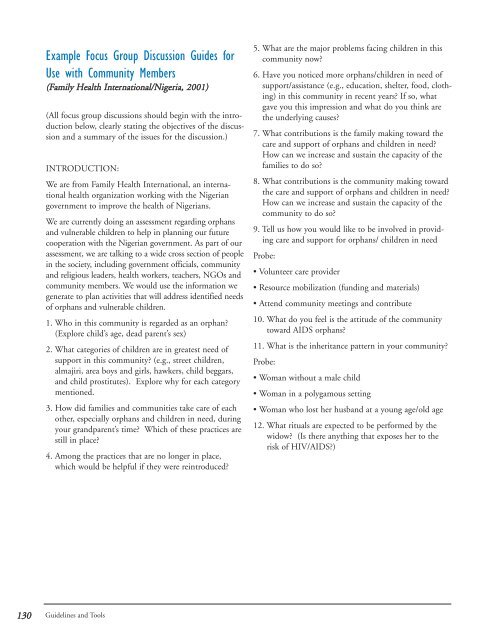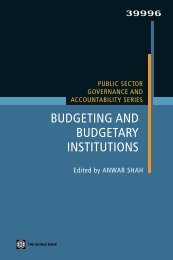Conducting a Participatory Situation Analysis of.pdf - Global HIV ...
Conducting a Participatory Situation Analysis of.pdf - Global HIV ...
Conducting a Participatory Situation Analysis of.pdf - Global HIV ...
You also want an ePaper? Increase the reach of your titles
YUMPU automatically turns print PDFs into web optimized ePapers that Google loves.
Example Focus Group Discussion Guides for<br />
Use with Community Members<br />
(Family Health International/Nigeria, 2001)<br />
(All focus group discussions should begin with the introduction<br />
below, clearly stating the objectives <strong>of</strong> the discussion<br />
and a summary <strong>of</strong> the issues for the discussion.)<br />
INTRODUCTION:<br />
We are from Family Health International, an international<br />
health organization working with the Nigerian<br />
government to improve the health <strong>of</strong> Nigerians.<br />
We are currently doing an assessment regarding orphans<br />
and vulnerable children to help in planning our future<br />
cooperation with the Nigerian government. As part <strong>of</strong> our<br />
assessment, we are talking to a wide cross section <strong>of</strong> people<br />
in the society, including government <strong>of</strong>ficials, community<br />
and religious leaders, health workers, teachers, NGOs and<br />
community members. We would use the information we<br />
generate to plan activities that will address identified needs<br />
<strong>of</strong> orphans and vulnerable children.<br />
1. Who in this community is regarded as an orphan?<br />
(Explore child’s age, dead parent’s sex)<br />
2. What categories <strong>of</strong> children are in greatest need <strong>of</strong><br />
support in this community? (e.g., street children,<br />
almajiri, area boys and girls, hawkers, child beggars,<br />
and child prostitutes). Explore why for each category<br />
mentioned.<br />
3. How did families and communities take care <strong>of</strong> each<br />
other, especially orphans and children in need, during<br />
your grandparent’s time? Which <strong>of</strong> these practices are<br />
still in place?<br />
4. Among the practices that are no longer in place,<br />
which would be helpful if they were reintroduced?<br />
5. What are the major problems facing children in this<br />
community now?<br />
6. Have you noticed more orphans/children in need <strong>of</strong><br />
support/assistance (e.g., education, shelter, food, clothing)<br />
in this community in recent years? If so, what<br />
gave you this impression and what do you think are<br />
the underlying causes?<br />
7. What contributions is the family making toward the<br />
care and support <strong>of</strong> orphans and children in need?<br />
How can we increase and sustain the capacity <strong>of</strong> the<br />
families to do so?<br />
8. What contributions is the community making toward<br />
the care and support <strong>of</strong> orphans and children in need?<br />
How can we increase and sustain the capacity <strong>of</strong> the<br />
community to do so?<br />
9. Tell us how you would like to be involved in providing<br />
care and support for orphans/ children in need<br />
Probe:<br />
• Volunteer care provider<br />
• Resource mobilization (funding and materials)<br />
• Attend community meetings and contribute<br />
10. What do you feel is the attitude <strong>of</strong> the community<br />
toward AIDS orphans?<br />
11. What is the inheritance pattern in your community?<br />
Probe:<br />
• Woman without a male child<br />
• Woman in a polygamous setting<br />
• Woman who lost her husband at a young age/old age<br />
12. What rituals are expected to be performed by the<br />
widow? (Is there anything that exposes her to the<br />
risk <strong>of</strong> <strong>HIV</strong>/AIDS?)<br />
130<br />
Guidelines and Tools















